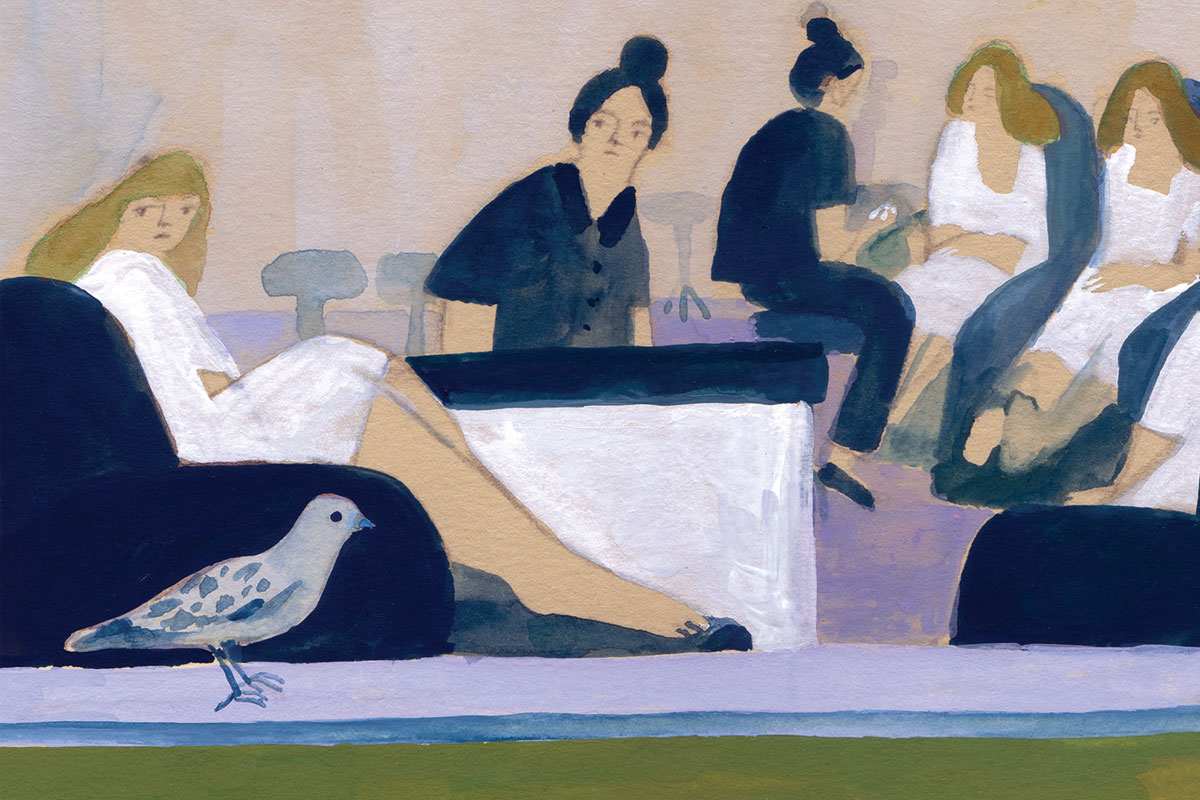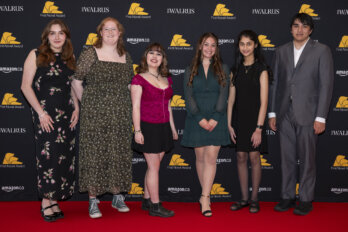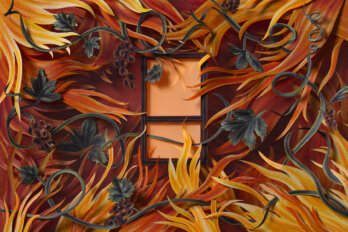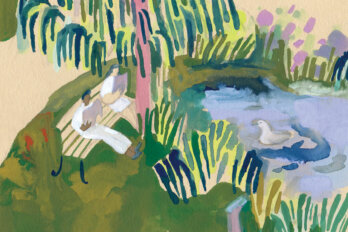FICTION / JULY/AUGUST 2024
Pick a Colour
BY SOUVANKHAM THAMMAVONGSA
ILLUSTRATIONS BY JULIA GR
Published 6:30, Jul. 26, 2024
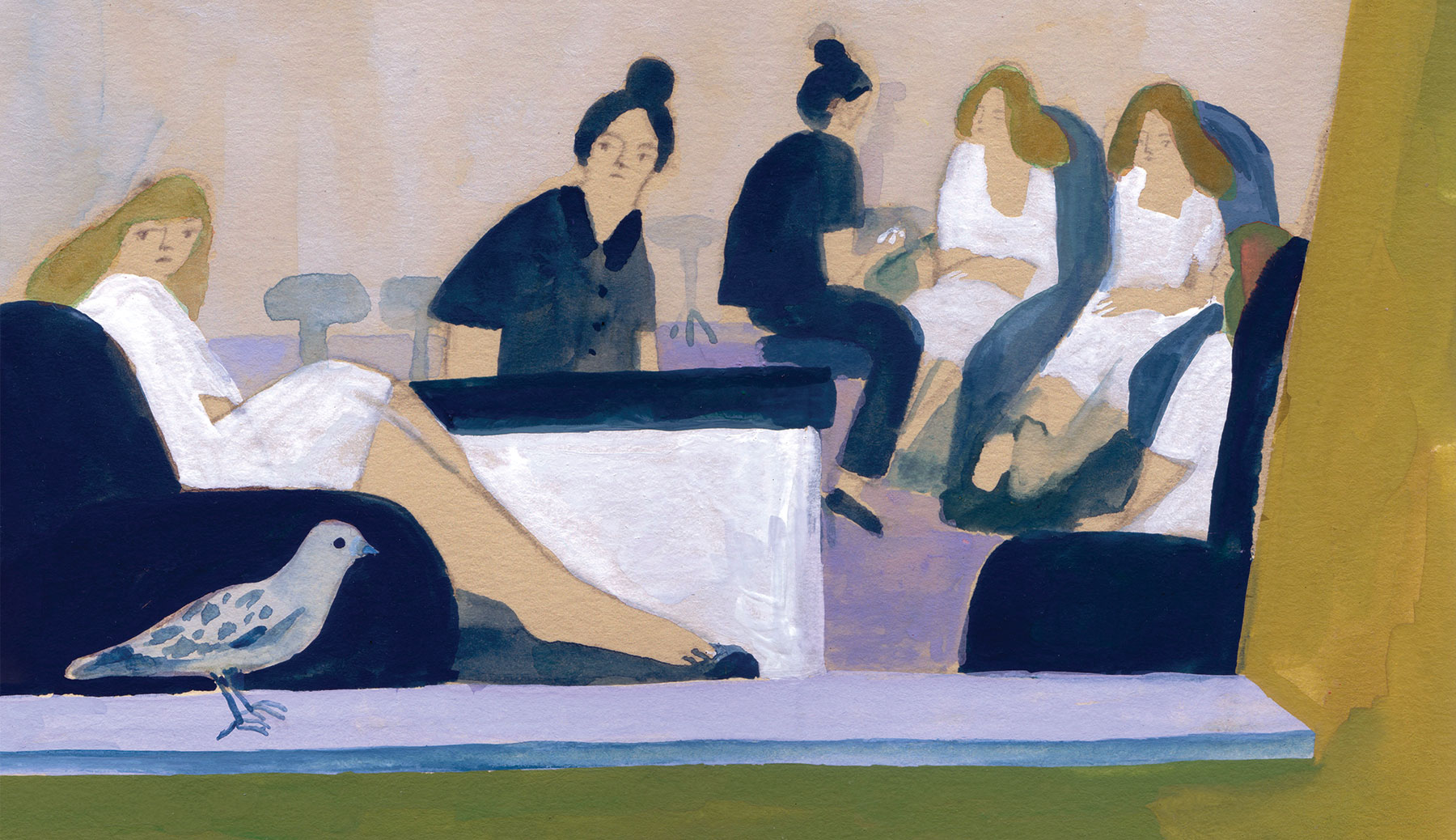
Back here, I can hear a group of women trickle in. Filling the floor with giggles and voices. I can’t see their faces and don’t know how many there are, but I can tell from the sound there’s probably more than three. When I go out to the front room, I panic because I have trouble with this group instantly.
I can’t tell any one of them apart.
They each have the same outfit on. A white cotton dress and cream-coloured flip-flops. They aren’t all related. They are friends.
One says she’s Liz-ee with a “y.”
The other one says she’s Liz-ee with an “ie.”
Lily.
Lou.
Mai asks me: “Damn, how are we going to tell these girls apart?” and when I don’t seem to be paying attention, she snaps, “You paying attention?”
I say to her, “We don’t need to tell them apart. Just get them done, and out. They want everything done. Toes, nails, face, hair.” I look at those parts quickly—toes, nails, face, hair—and quickly try to find differences among them. Shapes, textures. Gait, voice, manner.
We need an extra girl on the floor with us. It would be Nok’s shift, but she hasn’t come in and she hasn’t been in when she’s scheduled. As if hearing a voice thinking inside my head, I hear it outside of me:
“It’s been a half hour since Nok’s shift started and she’s not even here,” Mai, at the desk, tells me. “If that were me, you’d tell me not to come back.”
“Again, huh,” I say.
“Again,” she repeats.
I join her at the desk and check the work schedule from last week, and it’s true she wasn’t here then. I knew that without having to look, but I just want to make sure there’s a record of it. It’s unlike Nok not to be at work this long. She’s got two little ones. Haven’t heard from her. Not a call. Nothing.
She doesn’t live far from here. I think of dropping by her house on my way home. See if she’s okay.
I try her phone. Nothing.
“You think I should be worried about her?” I ask Mai.
“I’d worry about you.”
“Something doesn’t feel right,” I say, looking at the bridal group in front of us.
“You want me to go by her place after my shift? Just to check?” Mai asks.
“I can do that.”
“You don’t have to do everything yourself.”
“I can do it.”
I think back to what happened two weeks ago.
“You think you can give me a few months’ pay now?” Nok had asked me.
“That’s a lot all at once,” I said, hesitating.
“I know,” she agreed. “It’s just I’m short. Running behind on bills.”
Her ex hadn’t kept up his payments. Threatened bankruptcy. If he went through with it, that would be it. None at all. So I gave it to her. Wrote a cheque out. And she hasn’t been in since then.
I remember her first day here.
Nok came in with her kids. Two little ones. Seven and five, girl and boy. She had no place to drop them off. No family to look after them. It was only going to be for the hours she worked.
We had suggested they stay in the backroom with crayons and paper, but after only two minutes they ran out to the front room. They wanted to see their mother.
Children know how to get attention. Just them sitting there by the window had people looking in and waving. The little boy walked up to the window and put up both hands, patting the glass. He put one hand in the air and a passerby stopped, gave him a high-five. And then he wriggled side to side. The girl joined him and did
the same.
I never threw out their drawings.
After that, Nok started to come in with the two of them for her shifts all the time. It just kind of happened, and I didn’t say anything about it. They don’t have a place to go. Besides, I like having them around. I haven’t got family. But when I think about it, I have what I want to have. Does me no good to say that, though.
I told those kids about the aquarium in the city. They can touch a stingray.
“I’m scared,” the boy said.
“Won’t it sting you?” the girl asked.
“I wouldn’t be scared,” I said bravely. “They remove the sting so it’s safe.”
“They shouldn’t remove it,” the boy suggested. “They should invent a device and . . . and . . . attach it . . . to the end so it doesn’t sting you.”
Kids. They come up with ideas just like that. No one’s told them: “That’s not how it works,” “That can never happen,” or “How is that possible?” I thought it, but I didn’t say. Didn’t want to be one of those voices.
When we weren’t busy on the floor, they liked putting makeup on me and the girls. We’d line up in a row, and they’d pick up a brush and colour our eyelids, make circles on our cheeks, and line our lips.
“Hey, she’s here,” Mai tells me.
It’s the standby girl. Took her about ten minutes. She pulls at the glass door and enters the shop. Waves to everyone in one swoop. She is wearing a pink summer dress, and I eye that. She knows what I’m thinking and says, “Yeah, I have my clothes in my bag,” and taps her tote bag and slips away.
We all are dressed the same here. Black shirt, black pants, black shoes. Our hair is also black and the same length, more or less.
The girl’s name is Annie—it doesn’t mean anything in our language. She would be thought of as beautiful, but she slouches. She’s taller than all of us, but you wouldn’t know.
“Susan,” Annie says to me, looking at my name tag. She looks over at Mai and says again, “Susan.” She is also wearing the same name tag. Everyone at the shop wears the same name tag. So many girls come and go, but our names are the same.
“Susan,” Mai echoes, responding to Annie.
“Ladies, ladies, ladies. Are we fully booked or what?” I say excitedly to all the girls on the floor. “Business is booming!” I shout like a circus host. We laugh to ourselves. Our names popping like the bubbles in the plastic tubs we bring to our clients.
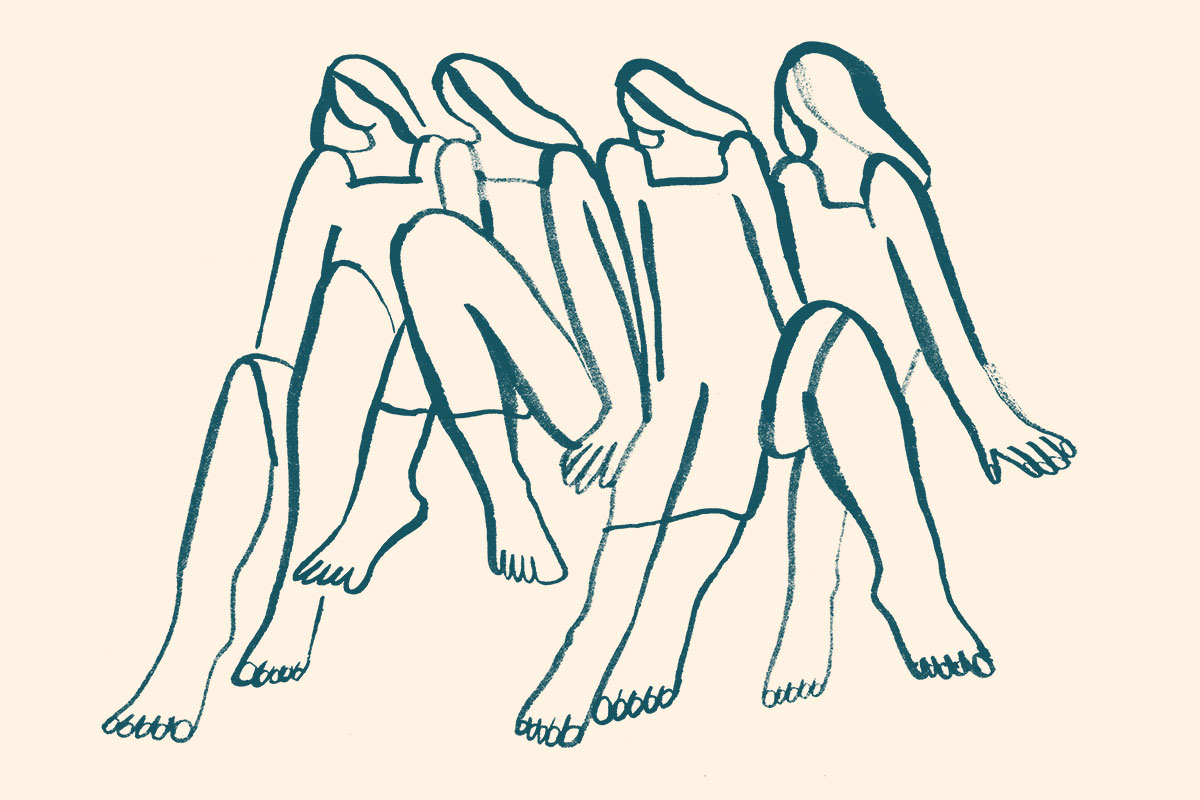
Lizzy, Lizzie, Lily, Lou. Lizzy is the bride and not Lizzie. To make things more difficult for us, Lily and Lou are actually identical twins. I am the first of us to move and take Lizzy to the wall and point to the water for her toes. And she knows what to do.
Mai takes Lizzie.
Lou and Lily tell each other to have Annie take them. After their fussing, Annie takes one.
Lizzy is the first to talk.
She asks who is getting married. She knows the answer, but she just wants it said out loud. She wants a cheerleading squad. They all yell out, “Lizzy!” and the girls know their lines and join in too.
I don’t know why I don’t join.
I look over at Lizzie and wonder if she might, for a moment, think it’s her since her name sounds exactly like the bride’s name. She gives no sign, and I think they tell themselves apart easily. It’s how you know they know each other.
Lizzy has decided they will all wear the same colour polish. A light pink. Must have picked that out while we all waited for Annie to get here.
We will start with their toes because polish on the toes takes longer to dry and gets ruined easily. Then, we’ll move to their hands. After that, threading and tweezing.
Lizzy tells me she doesn’t want wax on her skin. She feels threading is more precise because you measure the angle of the face better with a thread.
It’s all the same result to me, whatever the approach. But I don’t say. I do according to Lizzy’s want.
Once I am done, I will pass the nail colour to Mai. Then it will get to Annie. By the time Mai passes it back to me, I will have Lizzy’s hands ready to paint.
Once we have them in chairs like this, we don’t move them around. They are getting everything done. Takes too much time for them to move, to go where we want them to go. Moving them is a risk. Might trip, nail colour hasn’t dried, and we’d have to start with all that again. In and out, in and out is all I’m thinking of doing.
It takes a lot to focus and paint. The paint starts at just a little distance from the cuticle. Needs that room so it grows out nicely. Not having that distance is poor technique. Don’t want to have poor technique. I look at the nail and its shape. How much of the finger the nail takes up. Can’t put a big blob of paint. Takes longer to dry that way and air might slip underneath. Might form a bubble in a few days. Plus, I can’t be generous. Adds up, you know.
Lizzy, I notice, has a mole the size of a small pebble underneath her big toe. When I notice this, I feel relieved. It’s like seeing the shore from a distance. A place to land. It’s a spot to know this belongs to this person and no other here.
I am always looking for the thing that makes people different from each other. Most people want to belong, to look like someone they’ve seen, to be like other people. I don’t. I like the distance and the thinking I do from there.
I look over at her friends—Lizzie, Lily, Lou—and turn back to Lizzy, look for what else on her makes her different.
There is a skin tag near her wrist. There are a few batches of hair on each of her big toes. She should shave them, but I don’t think she noticed them. That’s an area a lot of people don’t think of shaving. Might also be that she’s nearsighted. The third toe on her left foot is longer than her big toe. Just slightly. Huh. There might have been an eleventh toe. I feel a nub of something there like it’s missing, and I see a healed scar.
I don’t ask about that.
She doesn’t notice my finger. To notice that, you have to be looking at me. Since she’s come in, she hasn’t really looked at me. She knows I am there and what I do. She knows that of the other girls too. She knows the nail colour she wants, her friends, where to sit, where to pay. She even notices the street outside. The time.
But not me.
I don’t mind. I would have to talk about myself, what my life is like outside of here. Family, friends. Don’t want to talk about any of it. Just want to work. When she looks at the top of my head when I am painting, I lower it. If I look up, she might try to get us talking. This way, her need to talk is directed at her own friends.
I touch the heel of her foot, the cushioned parts, and she squiggles it away. Means she’s ticklish there. There’s a laugh, but it doesn’t come from Lizzy. My ear finds the laughter.
It’s Lizzie. Her big toe is what makes her laugh. When Mai reaches for it, she pulls it back instinctively and apologizes. Then brings it back, bracing.
Lou has freckles on her legs. She wants yellow nail polish but wants to look like the rest of the party. She stares longingly at the yellow nail polish bottle. She won’t wear it, but she asks Annie to test it so she can see what it looks like on her.
When Annie is finished painting her left pinky—that’s the nail I like to demonstrate on too, because it’s small and uses up less nail polish—Lou tells her maybe it’s a colour for next time.
We move on to the threading.
Lizzy has two beauty marks in different spots in her eyebrow. They are very small. I doubt she notices or that anyone looking at her would notice. There’s also another tiny beauty mark on her chin.
Beauty marks have meaning to us. We read them like tarot cards. One near the lip means you’re a talker. One on the eyelid means you will spend a lot of time sleeping in this life, because to see it, the eyelid has to be closed. One near the tear duct either means you will make other people cry about you or you will cry about other people. Sometimes you’re born with them, other times they just appear suddenly. Either way, we know about you and what’s destined for you.
At my right, Mai is working in sync with me. It is like we are one. Measuring and pulling the same areas of hair. I wonder what she’s noticing. What particulars stand out. I want to go over there, stand near her, see what she sees, feel her work. But I have got my own work in front of me.
I quickly glance over at Annie, and she’s steps behind. Still on the toes. She should have moved to the face and, like us, be at the face doing something about the hairs. Might have to join her, help her move along.
I will get to Lily in no time. Or is that Lou? I don’t know and decide it’s Lily sitting there at the station. I glance at Lily and see she is scrolling through her phone. I look at her toes and see how long her toenails are. I won’t ask her if she wants them cut or filed. I will just offer to cut them.
They all do get what they ask for, but I do the work of asking leading questions that get them to ask for what they should have done. I know what they should get done, the way those lawyers in their fancy suits on television already know the answers of someone on the stand. I draw it out, what I already know the answer to. I draw it out.
I ask if Lily wants her toenails cut.
Lily, sitting above me now and peering down at her own toes, tells me they look short to her already.
“They do, from where you are sitting,” I want to say, “but they are not.” Instead, I say I can cut just a bit.
I bring the fingertip of my left thumb and the one next to it together and show her how tiny I want to cut.
She doesn’t notice my finger. Just the space I have made with the ones I do have.
She nods. I nod too and cut. Perching all her toes where my missing finger is. I am right that it’s a good thing to have all this space. I can move quickly, get them in and out. And they don’t know how I am able to do that.
Lily has a patch of dry skin on her right knee. She’s scratched at it several times, it’s almost red. I bring an ointment from my basket and rub it in.
On her left inner leg, there’s a line of hair she’s missed. Means she shaves with a razor and was in a rush to be done. Maybe she got soap in her eye and couldn’t see through the hail from the shower and forgot about it. She is not ticklish.
Her hands are strong like she works with them all day. I ask her what she does, and she says she’s a receptionist.
Someone who types all day at the desk has a lot of tension between their fingers. I spend extra time putting pressure there, and also on her knuckles and the area that allows the thumb to spread. When I paint her nails, every time I move to another finger to put on colour, she resists, and I remind her to relax.
Imove on to Lou, still with Annie, and file down her thumbnail. It was a short nail. It opens up the skin and splits. Blood rushes out.
I apologize.
Annie looks on, surprised I would make such a rookie mistake. I pretend I’m not bothered and grab alcohol and something to seal it.
Lou winces.
I catch, out of the corner of my eye, Lizzy looking at the park across the street. I turn my whole head to her, and she seems to look further than that. I can see her mind turning and thinking as her eyes are fixed on that distance.
It’s the face of someone who is thinking of the future, the rest of their life. I see the shape of her eyes change. They look larger, but they are not. It’s tears. When that happens, you don’t ask someone what’s wrong, unless they say. I leave my noticing and turn back to Lou.
I thought the floor would sound like geese, but it’s strangely quiet. I can hear what is outside. A streetcar. The warm and long honk that can only come from a truck.
Every day, I wake and want the smell of feet. It isn’t stink. When you know what something is and where it comes from, it isn’t stink.
The phone rings.
And I know instantly what that means. Someone out there wants me today. I feel the fast beat of my heart like there’s a pigeon pecking at me from the inside.

